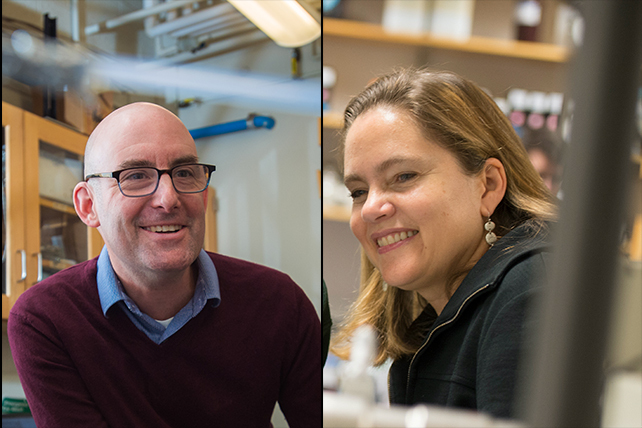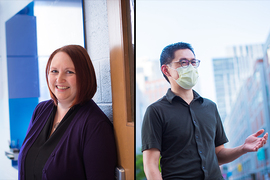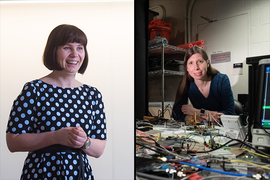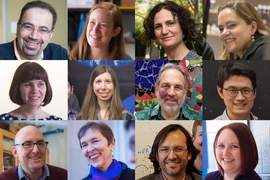Professors Jesse Kroll and Cathy Drennan are enthusiastic, whether students are sharing exciting early experimental results or raising concerns about public speaking. The two have been honored by a student-driven process as “Committed to Caring” for their dedication to students’ well-being and futures and for their ardent advocacy for student needs.
Jesse Kroll: Congenial community
Jesse Kroll is an associate professor in MIT’s departments of Chemical Engineering and Civil and Environmental Engineering. He joined the MIT faculty in 2009 after completing a PhD at Harvard University, serving as a postdoc at Caltech, and then working as a senior scientist at Aerodyne Research.
Through field sampling and testing as well as reactor-based experiments on oxidation, the Kroll lab studies particulate pollution, characterizing the sources and transformations of organic compounds in the atmosphere. The group aims to better understand which policies could help alleviate the health and climate effects of pollution.
Celebrating the whole student
Core to Kroll’s advising are weekly one-on-one meetings with each advisee. Both Kroll and his advisees eagerly await these meetings. Writes one advisee, Kroll’s “amazing ability to listen and empathize during these frequent meetings has allowed me and multiple labmates to discuss mistakes we have made in research and life.” Kroll creates a comfortable setting to parse and resolve challenges.
Recurring reflection is critical in research. Kroll finds the weekly meetings an excellent opportunity to learn from his students as well as take a step back and collaboratively problem-solve. To Kroll, mentoring is “completely woven into the research process, and you can't succeed in one without succeeding in the other as well.”
Pointing to the rarity of recognizing students as multifaceted people, Kroll’s advisees express gratitude for his interest and openness about life beyond research. Labmates “openly discuss their other interests in front of Jesse,” according to a nomination letter. Advisees frequently mention how thoroughly Kroll demonstrates that he cares for them as whole people.
Considerate advocacy
Advisees describe Kroll as “selfless … immensely thoughtful, intelligent, compassionate, and encouraging.” Students are comfortable raising difficult topics with Kroll. One of his advisees experienced harassment from another professor based on their religion and sexual orientation. When they raised the issue, the student was grateful for Kroll’s response as well as his support through the process of reporting it.
Disruptions are common during the PhD process. When a professor announced that they were leaving MIT, Kroll emailed their advisees to offer support through the transition. Kroll checked in regularly, offered use of the Kroll lab, and helped ensure the remaining advisees could finish their degrees.
In another instance, a student needed support with accommodations due to a health issue. Kroll advocated for the student, and protected their privacy from the rest of the laboratory. Advocating for advisees is a Mentoring Guidepost identified by the C2C program.
Remarking on moving forward amid the hassles and uncertainty of the pandemic, Kroll emphasizes flexibility. “Everyone's productivity level has been affected differently,” so he meets people where they are. The weekly individual meetings continue, as a chance to check in and connect.
Cathy Drennan: Compounding caring
Drennan has been a professor at MIT since 1999. She started in the Department of Chemistry and has since also joined the Department of Biology. Drennan’s laboratory focuses on using X-ray crystallography to study the structure and function of enzymes important in remediating damage to the air and water. The lab also investigates metalloprotein biochemistry and the dynamics of environmental modulation of metalloprotein reactivity.
Through 2025, Drennan is serving as a Margaret MacVicar Faculty Fellow, a program that recognizes faculty who have made “exemplary and sustained contributions” to undergraduate education at MIT.
Snowballing kindness
Striving to create a lab environment where “one person’s success is everyone’s success” matters greatly to Drennan. Very intentionally, she crafts expectations for the laboratory to discuss. Together, Drennan and her students build a collaborative laboratory family where, according to one nominator, “we all feel welcomed despite our differences.”
Having experienced great mentorship in graduate school, Drennan is keen to extend this practice. In particular, she recalls “the sense of being treated more as a colleague than as a student … feeling like your advisor listens to your scientific ideas and you have a seat at the table where experiments are being designed.” Drennan builds this mentality into her interactions with advisees.
One advisee credits Drennan’s “valuable mentorship and willingness to believe in [them]” as critical to their being at MIT and progressing on experiments. Validating students by demonstrating interest in their ideas and confidence in their abilities is a C2C Mentoring Guidepost.
Thoughtful advising compounds. Drennan emphasizes that people emulate the type of advising they have experienced, for both better and worse. Drennan’s advisees go on to support their students and extend patterns of inclusive, caring advising to the broader biology and chemistry communities. One advisee mentions their aim to work with underserved communities on education and economic mobility, inspired by Drennan’s commitment to community service.
Embracing vulnerability
A fierce support for her advisees, Cathy Drennan creates space for vulnerability. In one instance, a student disclosed to Drennan that they had experienced trauma. Per a nomination letter, Drennan’s response was, “‘My job is to help you achieve your goal of becoming a professor. Putting your health first and dealing with your past now, instead of later down the road when you are trying to launch your career, is part of me best preparing you for success.’” Swiftly, Drennan cancelled several meetings and events to enroll in a two-day workshop on how best to mentor students who have experienced trauma.
In another instance, a student repeatedly felt validated and supported when sharing about a family member’s illness and their own mental health challenges. In the student’s words, Drennan “reminded me that I am capable and deserve to be a graduate student at MIT.” Grappling with imposter syndrome and worries about whether they belong is a common predicament for students.
Drennan is trying to reshape expectations for science, because she finds that narratives about what constitutes success are often inaccurate. Instead, she emphasizes that “when you fail, you’re really pushing the envelope and that’s what great science is.”
More on Committed to Caring
The Committed to Caring program is an initiative of the Office of Graduate Education and contributes to its mission of making graduate education at MIT “empowering, exciting, holistic, and transformative.”
Since 2014, C2C has invited graduate students from across MIT’s campus to nominate professors whom they believe to be outstanding mentors. Selection criteria for the honor include the scope and reach of advisor impact on graduate students’ experience, excellence in scholarship, and demonstrated commitment to diversity and inclusion.
The most recent outgrowth in 2019 took the form of a Faculty Peer Mentorship Program (FPMP) in which C2C faculty act as peer mentors to incoming MIT professors. The program provides one-to-one matches with the goal of fostering strong mentorship practices and providing a network of support.
By recognizing the human element of graduate education, C2C seeks to encourage excellent advising and mentorship across MIT’s campus.










